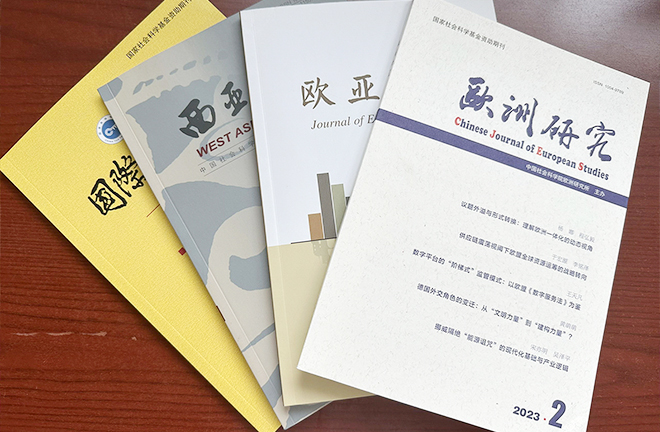Promoting stratified development of Area Studies

Area Studies thrives in China. Photo: Zhao Yuan/CSST
Due to significant demands of national development and financial investment, Area Studies has emerged as a thriving institutional framework and a focal point of disciplinary growth in Chinese universities. This development is primarily manifested in three key areas.
Firstly, universities have quickly established dozens of research institutions, and relevant national departments and education regulators have initiated hundreds of special projects. A considerable number of institutions have begun to actively recruit students and provide relevant training for society and enterprises.
Secondly, within various universities, there has been a concentrated effort to dedicate institutional arrangements to Area Studies, laying a preliminary foundation for their long-term development.
Thirdly, within domestic universities, two distinct research pathways have emerged. The first pathway emphasizes the humanities, drawing upon disciplines such as literature, history, philosophy, and foreign languages. It places emphasis on diversity and differences, delving into the historical origins of civilizations. The second pathway focuses on the social sciences, relying on disciplines such as political science, economics, law, diplomacy, and international relations. This pathway engages in analysis related to tracking realistic interests.
Compared to other periods in other countries, the progress, scale, and impact of Area Studies in Chinese universities have been quite spectacular in recent years.
Innovation through inheritance
So far, the theoretical foundation of Area Studies is relatively weak. Its proprietary theories and methodologies have not yet taken shape, leaving a significant gap in its development as an independent discipline. Existing academic history has shown that the key to knowledge progress is innovation through inheritance, namely the continuous updating and breakthroughs of research paradigms, as well as the exchange, evaluation, and critique of different schools of thought. By this standard, Area Studies is still in the early stage of academic growth, both domestically and internationally.
Area Studies has a long history and abundant achievements, enriching academic discourse and providing differentiated research paradigms to various extents. However, these academic clusters largely construct specific knowledge of their respective domains and gather historical information about target areas (countries). From a contemporary perspective, they lack holistic discussions on Area Studies as a whole, without ideas suitable for China to initiate creative dialogues with target areas (countries) and build new communities with a shared future. There is also a lack of theoretical positioning regarding the holistic connections between different regions in the era of profound changes.
Existing discussions on Area Studies in domestic universities lack self-reflection, dialogues, and critiques. The essence of modern sciences lies in self-reflection and sublimation. For Area Studies to thrive, it is essential to cultivate an assessment and reflection system for the subject and establish mechanisms for dialogue and critique among scholars. It is also important to delve into seemingly metaphysical but fundamentally rational issues, such as the concepts of “self” and “others” in different historical eras. Only by adhering to this direction can existing Area Studies gradually incorporate different ideas and schools, cultivate a good sense of ontology and methodology, gradually form consensus around supporting courses and specialized knowledge, and thus transform itself into a “sub-discipline.” (It resembles a general discipline in structure, and has its own academic core, though a mature and comprehensive academic system has yet to be fully developed.) Area Studies in a disciplinary sense cannot be conducted without reflection and questioning.
Stratified development
Drawing inspiration from the concept of “stratification” in geology, it may be possible to see the stratified development of Area Studies in the future, revealing a greater development space for young scholars.
Stratification refers to the layered structure produced in the changes of rocks along the vertical axis. It provides insights into the various ages, depositional environments, sedimentation processes, and structural characteristics of sedimentary rocks. This is achieved through the distinct changes or gradual transitions in the material composition, structure, and color of the rock, which give rise to unique bedding patterns or textures between the layers.
The stratification process is long and complex, and its classification and interpretation can reveal the characteristics of geological structures and the surrounding atmospheric and spatial environment. This, in turn, aids in the analysis of the laws governing the emergence and evolution of the universe. It inspires us that the key to establishing a disciplinary form is whether there exists a rich and differentiated hierarchical structure and analytical hierarchy, and whether there is a conscious awareness of the overall and categorical nature of the discipline.
In a vast and diverse country like China, with its unique regional development and foreign exchanges, the stratified approach becomes even more relevant. It is crucial to encourage local universities and teachers to harness their enthusiasm, activate existing resources, tap into their research potential, and embark on exploratory endeavours.
The narrative of Chinese modernization and Area Studies in the new era should not only be shaped by authoritative departments or a few key universities, but also by the distinct perspectives and contributions of various local universities. When the roles of various entities are fully utilized, Chinese characteristics will manifest themselves.
Creative Area Studies can help alleviate various foreign-related challenges facing countries and societies. If efforts are made to develop Area Studies in universities across China, it can not only develop into an independent knowledge system for engaging in dialogues with international peers, but also create highly valuable resources for future Area Studies with Chinese characteristics.
Wang Yizhou is a professor and dean of the Institute of Area Studies at Nanjing University.
Edited by ZHAO YUAN
